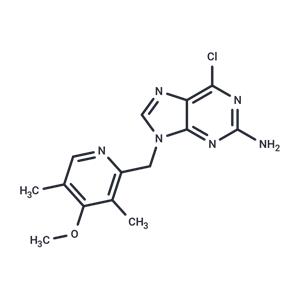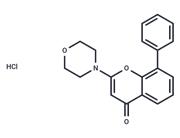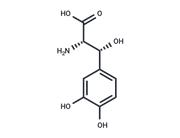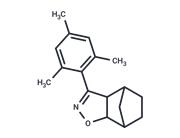| Name | BIIB021 |
| Description | BIIB021 (CNF2024) is an orally-available, fully synthetic inhibitor of HSP90(Ki=1.7 nM, EC50=38 nM). |
| Cell Research | A modified tetrazolium salt assay is used to measure the IC50. Tumor cells are added to 96-well plates and propagated for 24 hours before BIIB021 addition. BIIB021 is added to the plated cells. DMSO (0.03-0.003%) is included as a vehicle control. After incubation phenazine methosulfate (stock concentration 1 mg/mL) and 3-(4,5-dimethylthiazol-2-yl)-5-(3-carboxymethoxyphenyl)-2-(4-sulfophenyl)-2H-tetrazolium, inner salt (stock concentration 2 mg/mL) are mixed at a ratio of 1:20 and added to each well of a 96-well plate. Reduction of 3-(4,5-dimethylthiazol-2-yl)-5-(3-carboxymethoxyphenyl)-2-(4-sulfophenyl)-2H-tetrazolium, inner salt gives rise to a soluble formazan product that is secreted into the culture medium. After 4 hours incubation, the formazan product is quantitated spectrophotometrically at a wavelength of 490 nm. Data are acquired using SOFTmaxPRO software, and 100% viability is defined as the A490 of DMSO-treated cells stained with 3-(4,5-dimethylthiazol-2-yl)-5-(3-carboxymethoxyphenyl)-2-(4-sulfophenyl)-2H-tetrazolium, inner salt (the mean A490 of cells treated with DMSO at a range of 0.03-0.003%). Percent viability of each sample is calculated from the A490 values as follows: % viability = (A490 nm sample / A490 nm DMSO-treated cells × 100). The IC50 is defined as the concentration that gives rise to 50% inhibition of cell viabilit(Only for Reference) |
| Kinase Assay | Hsp90 Binding Assay: For fluorescence polarization competition measurements, the FITC-geldanamycin probe (20 nM) is reduced with 2 mM TCEP at room temperature for 3 hours, after which the solution is aliquoted and stored at -80 °C until used. Recombinant human Hsp90α (0.8 nM) and reduced FITC-geldanamycin (2 nM) are incubated in a 96-well microplate at room temperature for 3 hours in the presence of assay buffer containing 20 mM HEPES (pH 7.4), 50 mM KCl, 5 mM MgCl2, 20 mM Na2MoO4, 2 mM DTT, 0.1 mg/mL BGG, and 0.1% (v/v) CHAPS. Following this preincubation, BIIB021 in 100% DMSO is then added to final concentrations of 0.2 nM to 10 μM (final volume 100 μL, 2% DMSO). The reaction is incubated for 16 hours at room temperature and fluorescence is then measured in an Analyst plate reader, excitation = 485 nm, emission = 535 nm. High and low controls contained no BIIB021 or no Hsp90, respectively. The data are fit to a four-parameter curve and IC50 is generated. |
| In vitro | In various transplant tumor models, oral administration of BIIB021 effectively inhibits tumor growth. Specifically, in L540cy tumors, BIIB021 (120 mg/kg) is capable of suppressing cell proliferation. |
| In vivo | BIIB021 effectively inhibits cell growth in various tumor cell lines (IC50=0.06-0.31 μM), including BT474, MCF-7, N87, HT29, H1650, H1299, H69, and H82. It also suppresses cell proliferation in Hodgkin's lymphoma cells (IC50=0.24-0.8 μM), such as KM-H2, L428, L540, L540cy, L591, L1236, and DEV. Additionally, BIIB021 induces the degradation of Hsp90 proteins (including HER-2, Akt, and Raf-1) and upregulates the expression of heat shock proteins Hsp70 and Hsp27. |
| Storage | Powder: -20°C for 3 years | In solvent: -80°C for 1 year | Shipping with blue ice. |
| Solubility Information | DMSO : 45 mg/mL (141.17 mM), Sonication is recommended.
|
| Keywords | Heat shock proteins | BIIB021 | Autophagy | HSP | inhibit | CNF-2024 | CNF 2024 | Inhibitor |
| Inhibitors Related | Stavudine | Xylitol | Myricetin | Sodium 4-phenylbutyrate | Hydroxychloroquine | Guanidine hydrochloride | Taurine | Curcumin | Oxyresveratrol | Paeonol | Naringin | Gefitinib |
| Related Compound Libraries | Bioactive Compound Library | ReFRAME Related Library | Anti-Cancer Clinical Compound Library | Drug Repurposing Compound Library | Inhibitor Library | Anti-Aging Compound Library | Bioactive Compounds Library Max | Anti-Cancer Drug Library | Anti-Cancer Active Compound Library | Oxidation-Reduction Compound Library |

 United States
United States



